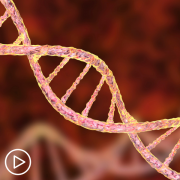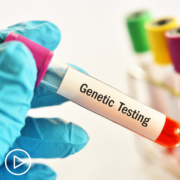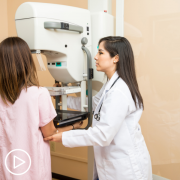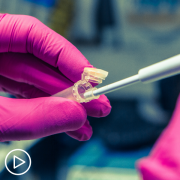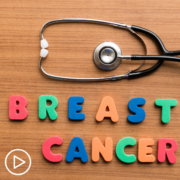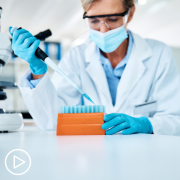How Do Genetic Mutations Impact Breast Cancer Risk, Prognosis and Treatment? from Patient Empowerment Network on Vimeo.
For breast cancer patients, how do genetic mutations impact risk, prognosis, and treatment? Expert Dr. Sarah Sammons provides insight about currently known genetic mutations and their impact on breast cancer care.
Dr. Sarah Sammons is an oncologist at Duke Cancer Institute and Assistant Professor of Medicine at Duke University School of Medicine. Learn more about Dr. Sammons here.
See More From INSIST! Metastatic Breast Cancer
Related Resources:
Transcript:
Katherine:
What are the known genetic mutations that can increase breast cancer risk?
Dr. Sammons:
Very good question. So, about 5 to 10 percent of all breast cancers are related to inherited genes. The most common ones that most patients have heard of, or most people have heard of in the media, are the BRCA1 and BRCA2, the BRCA genes. Those genes make patients highly susceptible to developing breast cancer throughout their lifetime. We’re talking 60 to 80 percent risk.
There are, over time, other genes that we have found also predispose patients to developing breast cancer.
There are over 10 at this point. Some of the most common ones are CHEK2, PALB2, PTEN, TP53, and CDH1. There are a few others, but those are kind of the main ones.
So, really when you develop a diagnosis of breast cancer, your oncologist and/or your surgeon will take a family history. They’ll keep into account your age, the type of breast cancer that you have, and we really have specific criteria now in which patients would qualify for genetic testing.
Genetic testing not only has become important to understand if you have a gene that could predispose you or your family to breast cancer, but we now have drugs that specifically target or are biomarkers for BRCA1 and BRCA2.
So, now it’s going to become even more important to test patients with early state and metastatic breast cancer because we have drugs that could actually specifically target BRCA.
Katherine:
How do these mutations impact a metastatic breast cancer patient’s treatment path?
Dr. Sammons:
Sure. Well, we can start with germline. So, really, right now, the only germline mutations that really impact a patient’s treatment are the BRCA1 and the BRCA2 genes. So, for patients that have germline mutations in BRCA1, we have a class of drugs called PARP inhibitors, that have been
shown to be more effective than chemotherapy in those patients. So, really, any patient that has a HER2-negative breast cancer – these genes are approved in HER2-negative breast cancer, so triple-negative or hormone receptor-positive breast cancer in patients that have a BRCA mutation.
It’s pretty critical to have this germline testing done because if they do have a mutation, then we would have a therapy for them that was more effective than chemotherapy. So, that’s why it’s important in that setting.
We’re also learning more and more, and research is evolving, that probably patients that have germline PALB2 mutations also may benefit from PARP inhibitors, but that data is still evolving.
In terms of somatic gene mutations, or next generation sequencing, your doctor might say that, “I want to send your tumor to look at the genes in the tumor that will help me decide what could be the next best therapy for you.” So, we would get a biopsy or use an old biopsy, and send your tumor to a variety of different companies that do this type of sequencing.
Some of them include FoundationOne, Curis, Tempus. And it would come back with a panel that would show what genes were mutated in your breast cancer.
About 40 percent of patients with hormone receptor-positive breast cancer have something called a PIK3CA mutation. And we have a drug called alpelisib (Piqray) that specifically targets that mutation.
Germline mutations usually also show up in the somatic testing. So, a BRCA mutation may also show up. The next generation sequencing also tests something called tumor molecular burden, which tells us basically how many mutations are altered in the DNA of your cancer. And we know that if you have many mutations, that you might be more likely to benefit from immunotherapy.
So, that’s another thing that we look at when we send that genomic sequencing. So, there are a variety of mutations and biomarkers that we can learn from sequencing the breast cancer, that will help us decide what’s the next best treatment for you in your metastatic breast cancer course.
Katherine:
What about prognosis, Dr. Sammons? Do these genes impact how a patient’s cancer may behave?
Dr. Sammons:
That’s a good question. The short answer is: Research is still evolving in this area, but I would say yes.
Katherine:
It sounds like it’s a qualified yet.
Dr. Sammons:
It’s a qualified yes. So, I would say for germline BRCA1 – we know that patients with germline BRCA1 are more likely to have triple-negative breast cancer.
So, in terms of early-stage disease, we know that triple negative breast cancer has a worse prognosis, a higher risk of coming back. But the FDA actually just approved PARP inhibitors in the early-stage setting for patients with BRCA mutations because it reduced the risk of recurrence.
So, where that settles out: Yes, we know that BRCA1 carriers are more likely to have triple-negative. Triple-negative is more likely to relapse, but every year we have newer and newer therapies that reduce the risk of relapse.
In the metastatic setting, BRCA carriers sometimes actually have been shown to live longer than patients without BRCA mutations because they’re more likely to respond to chemotherapy. We have the PARP inhibitor option – for all of those reasons.
In terms of gene mutations in the tumor, we do know that patients that have something called ESR1 mutations – so, if you have a hormone receptor-positive breast cancer, you have something called an ESR1 mutation.
We know that that means that you would be resistant to many of our endocrine therapies. And patients that have ESR1 mutations do usually have a shorter prognosis than patients that don’t.
So, there are a variety of mutations that are appearing to have impact on prognosis.


